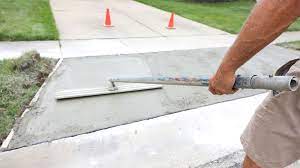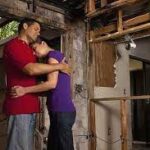Your driveway is not only a functional component of your property, but it is also an important component of its curb appeal. It may develop cracks, potholes, or other signs of wear and tear over time. When faced with driveway damage, property owners frequently debate whether to repair or replace it. This blog will go over the key factors to consider when making this decision and will assist you in determining the best course of action for your damaged driveway.
Counting the Costs of Damage
Assessing the extent of the damage is the first step in determining whether to repair or replace your damaged driveway. Different types of damage necessitate different solutions, and determining the severity of the issue is critical.
- Cracks:
Small cracks in the surface of the driveway are a common problem that can often be repaired rather than replaced. Temperature fluctuations, ground settling, and tree root growth can all cause cracks. Crack filler or sealant can usually be used to repair narrow and shallow cracks.
- Potholes:
Potholes are more severe and can be dangerous. If your driveway has a lot of potholes or if they are particularly deep, it may be time to replace it. Smaller potholes can sometimes be repaired, but their depth and the underlying causes must be assessed.
- Surface Wear:
Minor surface wear and tear, such as minor pitting or fading, can often be remedied by resurfacing or resealing. These cosmetic issues do not always necessitate a complete replacement.
- Structural Damage:
If your driveway has significant structural damage, such as extensive sinking or significant cracks affecting the base layers, it may be time to replace it entirely. The integrity and longevity of the driveway are jeopardized by structural issues, making repairs less effective.
Important Factors to Consider
Once the damage has been assessed, consider the following factors to make an informed decision:
- Cost:
The cost is a major consideration when deciding between repair and replacement. Repairs are typically less expensive than full replacements. If the damage is extensive or repetitive, or if your driveway is nearing the end of its useful life, replacement may be more cost-effective in the long run.
- Age of the Driveway:
The age of your driveway is an important consideration in your decision-making process. Repairs are a viable option if your driveway is relatively new and the damage is minor. Replacement, on the other hand, may be a better long-term solution if your driveway is old and showing signs of deterioration.
- Aesthetic Concerns:
Curb appeal is important, and a damaged driveway can detract significantly from the appearance of your property. If the appearance of your driveway is important to you, resurfacing or resealing can help restore its visual appeal without the need for a full replacement.
- Long-Term Durability:
Consider the long-term durability of the repair versus replacement options. While repairs may provide a temporary solution, they may fail to address underlying problems. Enhance your home with driveway replacement to ensure a new, long-lasting surface that will not require frequent repairs.
- Functionality and Safety:
Functionality and safety should always come first. Replacement is likely the safest option if your damaged driveway poses a safety risk due to deep potholes or uneven surfaces. A driveway with structural issues can also become a tripping hazard.
- Future Plans:
Consider your long-term goals for the property. If you plan to sell your home soon, a new driveway can increase its resale value and make it more appealing to potential buyers. If, on the other hand, you intend to live in your home for an extended period of time, long-term durability should guide your decision.
How to Repair a Damaged Driveway
If you decide that repairing your damaged driveway is the best option for you, the following are some common repair methods:
- Crack Filling:
Small cracks should be filled with a crack filler or sealant to prevent water infiltration and further damage. Inspect the cracks on a regular basis and reseal them as needed.
- Patching:
Patching is appropriate for small to medium-sized potholes. It entails filling and compacting the hole with asphalt patching compound. Proper compaction is critical for a long-lasting repair.
- Resurfacing:
Resurfacing entails laying a new layer of asphalt or concrete over the existing driveway. It can be an effective method for addressing surface wear and minor flaws.
Replacement of a Damaged Driveway
Consider the following steps when a full driveway replacement is the best option:
- Planning and Design:
Begin by designing and laying out your new driveway. Consider the materials, the color, and any extra features such as borders or patterns.
- Excavation:
The old driveway must be removed by digging. This procedure entails removing the old surface and, if necessary, addressing any base layer issues.
- Base Preparation:
For a long-lasting driveway, proper base preparation is essential. To prevent future settling and damage, the base should be properly graded, compacted, and well-drained.
- Material Selection:
Select the best material for your new driveway. Concrete, asphalt, pavers, and gravel are all options, each with their own set of benefits and aesthetics.
- Installation:
Depending on the material, the installation process may include pouring concrete, laying asphalt, or laying pavers. To ensure a high-quality installation, work with experienced contractors.
- Maintenance:
Follow a regular maintenance schedule to extend the life of your new driveway, which may include sealing, cleaning, and addressing any minor issues as soon as they arise.
Conclusion
Choosing whether to repair or replace a damaged driveway necessitates careful consideration of a number of factors, including the extent of the damage, the cost, the age of the driveway, and long-term durability. While repairs can be a cost-effective solution for minor issues, for older driveways or those with significant structural damage, a full replacement may be required. Finally, the decision should be in line with the needs of your property, your budget, and your long-term goals. Whatever path you take, a well-kept driveway improves the functionality and curb appeal of your property, adding value and convenience to your daily life. For expert advice and assistance with driveway repair or replacement, visit the Venture Concrete Columbia’s website.



